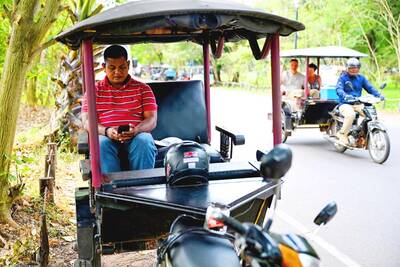Investigators believe that the theft of several ancient statues dating back to the Roman era from Syria’s national museum was likely the work of an individual, not an organized gang, officials said on Wednesday.
The National Museum of Damascus was closed after the heist was discovered early on Monday. The museum had reopened in January as the country recovers from a 14-year civil war and the fall of the 54-year al-Assad dynasty last year.
On Wednesday, a security vehicle was parked outside the main gate of the museum in central Damascus while security guards stood nearby. People were not allowed in because of the ongoing investigation.

Photo: AP
Two officials from the Syrian Directorate-General for Antiquities and Museums said that progress has been made in the investigation and that results are expected soon.
They spoke on condition of anonymity, because they were not allowed to speak about the details of the investigation to the media.
“God willing we will reach good results,” one of the officials said.
The country’s largest museum houses priceless antiquities. After the civil war started in March 2011, security was improved with metal gates and surveillance cameras, and authorities moved hundreds of artifacts to Damascus from across the country.
The Syrian Ministry of Culture in a statement on Wednesday released drawings of the six missing statues representing the Roman goddess Venus.
The ministry posted the registration number at the museum of each of the statues of the goddess of love, as well as their height, of which the highest is 40cm.
The statement urged that whoever has information about the statues come forward and contact the ministry through a telephone number or e-mail address that were provided.
The theft angered Damascus residents, who said that such acts tarnish the image of Syria as the country tries to rebuild from a war that left about 500,000 people dead.
“This is not only an aggression on the Syrian state, but an aggression on Syrian civilization,” resident Waddah Khalifeh said when asked about the theft.
He expressed fears that the thieves might aim to smuggle the statues and sell them abroad.
On Tuesday, the Directorate-General for Antiquities and Museums said that the theft did not affect activities at the museum and that the public was visiting the facility as usual.
However, a journalist who tried to enter the museum on Wednesday was told that all sections, including those that are outdoors, were closed because of the investigation.
The museum reopened on Jan. 8, a month after rebels ousted Bashar al-Assad as Syrian president, ushering in a new era for the country.
Fearful of looting, the museum had briefly closed after a rebel offensive ended five decades of al-Assad family rule.
The years of conflict had badly affected areas including the historic central town of Palmyra, once held by the Islamic State group.
In 2015, Islamic State members destroyed mausoleums in Palmyra’s UNESCO World Heritage site, which is famous for its 2,000-year-old Roman colonnades, other ruins and priceless artifacts.
“I hope that these pieces will be returned, because this is good for the new Syria,” said another resident, Hussein Abu al-Kheir, referring to post-al-Assad Syria.

The death of a former head of China’s one-child policy has been met not by tributes, but by castigation of the abandoned policy on social media this week. State media praised Peng Peiyun (彭珮雲), former head of China’s National Family Planning Commission from 1988 to 1998, as “an outstanding leader” in her work related to women and children. The reaction on Chinese social media to Peng’s death in Beijing on Sunday, just shy of her 96th birthday, was less positive. “Those children who were lost, naked, are waiting for you over there” in the afterlife, one person posted on China’s Sina Weibo platform. China’s

‘NO COUNTRY BUMPKIN’: The judge rejected arguments that former prime minister Najib Razak was an unwitting victim, saying Najib took steps to protect his position Imprisoned former Malaysian prime minister Najib Razak was yesterday convicted, following a corruption trial tied to multibillion-dollar looting of the 1Malaysia Development Berhad (1MDB) state investment fund. The nation’s high court found Najib, 72, guilty on four counts of abuse of power and 21 charges of money laundering related to more than US$700 million channeled into his personal bank accounts from the 1MDB fund. Najib denied any wrongdoing, and maintained the funds were a political donation from Saudi Arabia and that he had been misled by rogue financiers led by businessman Low Taek Jho. Low, thought to be the scandal’s mastermind, remains

Australian Prime Minister Anthony Albanese yesterday announced plans for a national bravery award to recognize civilians and first responders who confronted “the worst of evil” during an anti-Semitic terror attack that left 15 dead and has cast a heavy shadow over the nation’s holiday season. Albanese said he plans to establish a special honors system for those who placed themselves in harm’s way to help during the attack on a beachside Hanukkah celebration, like Ahmed al-Ahmed, a Syrian-Australian Muslim who disarmed one of the assailants before being wounded himself. Sajid Akram, who was killed by police during the Dec. 14 attack, and

VISHNU VANDALS: A Cambodian official accused Thailand of destroying a statue in a disputed border area, with video showing the Hindu structure being torn down The Thai military said ceasefire talks with Cambodia, set to begin yesterday, are expected to conclude with a meeting of the countries’ defense ministers on Saturday, as the two sides seek to end weeks of deadly clashes. The talks started at 4pm in Thailand’s Chanthaburi Province, which borders Cambodia. The Thai Ministry of Defense outlined several demands to be discussed ahead of the bilateral meeting of the General Border Committee (GBC) on Saturday. If secretariat-level discussions fail to reach agreement on key technical frameworks such as troop deployments, the Thai side would not proceed with the GBC meeting or sign any agreement on